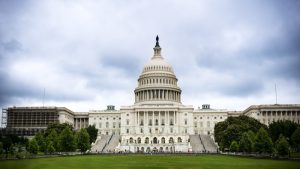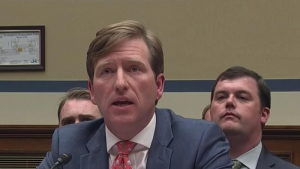Members of a key House cybersecurity subcommittee and a panel of expert witnesses agreed at a May 5 hearing on the pressing need to disrupt ransomware-driven cyber attacks, and aired a variety of strategies to more toward that goal.
Christopher Krebs, the Cybersecurity and Infrastructure Security Agency (CISA) Director fired by President Trump earlier this month for disputing broad White House assertions of fraud in the 2020 general election, said on a Nov. 29 broadcast of “60 Minutes” that multiple recounts of votes in Georgia offer a measure of proof that the election’s outcome was not impacted by widespread fraud.
Cybersecurity and Infrastructure Security Agency (CISA) Director Christopher Krebs reiterated late last Tuesday that foreign hackers won’t be able to change votes cast in the U.S. elections next month, and debuted a new CISA web page that provides advice about how citizens can deal with attempts to spread misinformation about the elections.
The Election Assistance Commission partnered with the nation’s lead cyber agency to aid election officials in prioritizing and managing risks to election infrastructure through an online tool.
The nation’s lead election security agency in conjunction with the Federal Bureau of Investigation said it has not seen any attacks on voter registration databases or voting systems this year.
This week the Federal agency primarily responsible for protecting elections held a training event to test its plans in advance of November’s Election Day. The third “Tabletop the Vote” exercise hosted by the Department of Homeland Security’s Cybersecurity and Infrastructure Security Agency, took place over a three day period from July 28 to 30, featuring 37 states and over 2,000 total participants, the majority of which participated remotely.
During today’s Senate Homeland Security Committee Hearing, both Committee Chairman Ron Johnson, R-Wis., and Cybersecurity and Infrastructure Security Agency (CISA) Director Chris Krebs agreed that CISA’s role is largely similar to the Federal Emergency Management Agency’s mandate.
Cybersecurity and Infrastructure Security Agency (CISA) Director Chris Krebs told the nation’s mayors this week that Federal government needs to ensure that state and local governments have the resources needed to combat growing cybersecurity concerns, and said that heightened security threats from Iran and elsewhere may help provide governments with the leverage to get that done.
The Department of Homeland Security (DHS), the Federal Bureau of Investigation (FBI), Facebook, and Microsoft hosted a joint briefing on Friday, Aug. 24, for the National Association of Secretaries of State (NASS) and the National Association of State Election Directors (NASED) regarding “actions being taken to combat malicious interference operations.”
Today’s House Committee on Oversight and Government Reform (OGR) covered the waterfront on election cybersecurity issues but came up with little that differed much from many of the other election cybersecurity hearings that have happened on the Hill over the last few months. The greatest hits were once again discussed–concerns over involvement in the 2016 election, threats facing the 2018 midterm elections, and how to respond to Russia cyber aggression towards U.S. election infrastructure and technology.








